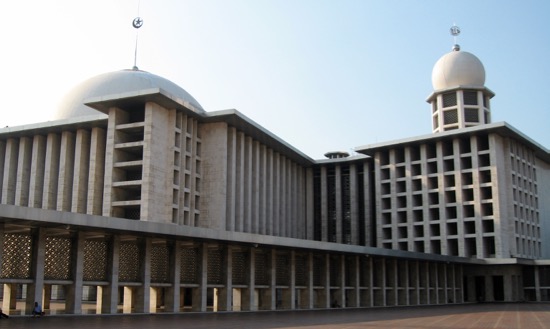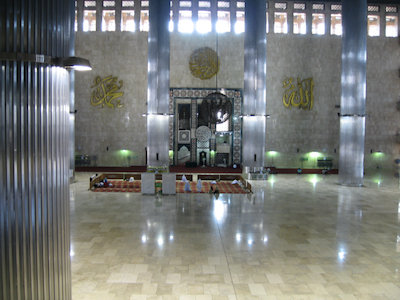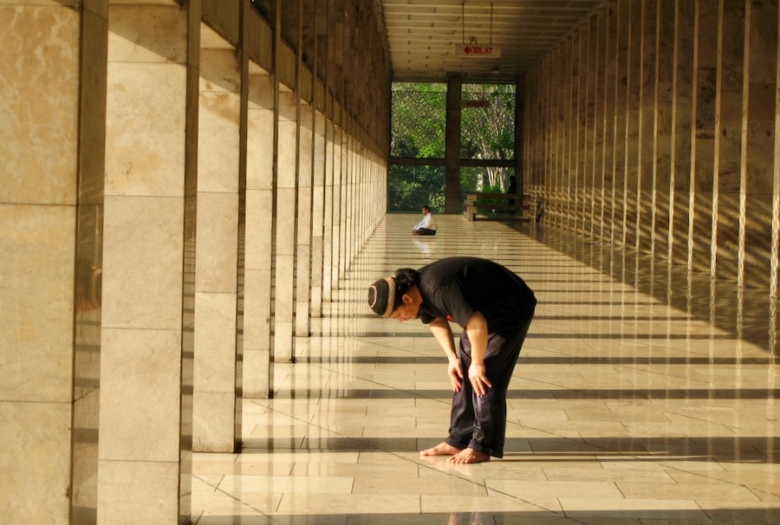IARJ News and Views: From Endy Bayuni in Indonesia, thoughts on UN’s new International Day to Combat Islamophobia

Istiqlal,which means
independence.(Photos of Istiqlal with this article by David Crumm.)
Editor’s Note: Starting this year, we are inviting long-time IARJ members from around the world to write occasional columns about their perspectives on religion. We are sharing these columns, under the label IARJ News and Views,
as a resource for everyone who cares about balancing perspectives on religion. In a first column in this new series, former IARJ Executive Director Endy Bayuni brings an important perspective on the United Nation’s new declaration of a special day each year to focus on combating Islamophobia. A common myth about Islam is that the world’s largest Muslim countries are in the Middle East. In fact, the world’s five largest Muslim countries by population, in order, are: Indonesia, Pakistan, India, Bangladesh and Nigeria.
While there is a compelling reason for the world to stem the rise of Islamophobia that is seen and felt in many parts of the world, declaring a day in the year to mark the International Day to Combat Islamophobia may be counterproductive, and possibly do a great disservice to Islam.
That is precisely what the United Nations General Assembly has just done, picking March 15 in memory of the mosque shootings in Christchurch, New Zealand, in 2019, that left 51 Muslims dead and injured 40 others. This was a tragedy that marked the culmination of the rising Islamophobia worldwide in the last two decades. So, it is a day worth remembering.
But singling out Islam as needing protection more so than any other faiths in the world may not be helpful to Islam and its followers, when we know that other religions, and their followers, have also been the targets of vicious and brutal hate and violence, both online and offline. And some of the deadliest hate and terrorist attacks have been carried out in the name of Islam.

Exclusivism is not in the nature of Islam. It runs counter to the oft-cited Quranic verse rahmatan lil alamin, that Islam is a religion of mercy for all creation. This inclusivity is one of the main reasons why Islam has been able to spread globally and so rapidly since its founding in the seventh century as a faith that welcomes all races and ethnicities and one that does not discriminate between rich and poor.
Today, Islam is still the fastest-growing faith in the world according to Pew Research Center, not only through births and migration, but also from winning converts. By 2050, Islam is predicted to surpass Christianity to become the single largest religion in the world.
This is happening in spite, or may be, because of the rise in Islamophobia. Making Islam look like an exclusive religion could be counterproductive to the spread of the faith. The resolution adopted by consensus at the UN General Assembly on March 15 declared the International Day to Combat Islamophobia, exactly three years since the Christchurch tragedy. The resolution was introduced by Pakistan on behalf of the Organization of Islamic Cooperation (OIC) and supported by dozens of countries, including Indonesia.
Resolution A/76/L.41 calls for strengthened international efforts to foster a global dialogue on the promotion of a culture of tolerance and peace at all levels, based on respect for human rights and for the diversity of religions and beliefs, and strongly deplores all acts of violence against persons on the basis of their religion or belief and such acts directed against their places of worship, as well as all attacks on and in religious places, sites and shrines that are in violation of international law.
Apart from being wordy, which is usual with UN resolutions, there is nothing wrong with the text as it does not single out Islam and recognizes the need to respect human rights, as well as acknowledging the diversity of religions and beliefs around the world. But by picking Islamophobia as the title and the objective of the resolution, it fails to recognize that many other religions and their followers are facing similar if not worse challenges through being persecuted, marginalized and discriminated against.
In introducing the resolution, the representative of Pakistan said Islamophobia had emerged as a new form of racism that includes, among others, discriminatory travel bans, hate speech and the targeting of girls and women for their dress, according to a UN press release.
While there were no opposition to the resolution, there were expressions of concern from countries where Islamophobia has been most problematic. France had proposed a text that endorsed the freedom of all religions and beliefs, and India said while there had been a global rise of sectarian violence, incidents of antisemitism, Christianophobia and Islamophobia, anti-Hindu, anti-Buddhist and anti-Sikh persecution abound as well, according to the UN press release.
The Indonesian delegation welcomed and supported the resolution and stressed the importance of promoting trust between peoples and cultures and constructing positive narratives around Islam.
As the country with the world’s largest Muslim population, Indonesia has been at the forefront in promoting interfaith dialogue, at the national, regional and international levels, addressing not only Islamophobia, but also hate and violence against other religions. The fight to counter Islamophobia is already going on, at the official and the grassroots level, without having to declare a day in the year dedicated to the cause.
There is already a proliferation of days to mark various causes at the UN. The last thing we need is another to mark the day to combat Islamophobia and organize the ceremonies that are bound to come with it. All countries should join hands in stemming the rise of Islamophobia and forms of phobia against all other faiths and beliefs. But the most important and most effective work is on the ground by faith communities, with little ceremony and fanfare.
Republished from The Jakarta Post with the permission of the author.

